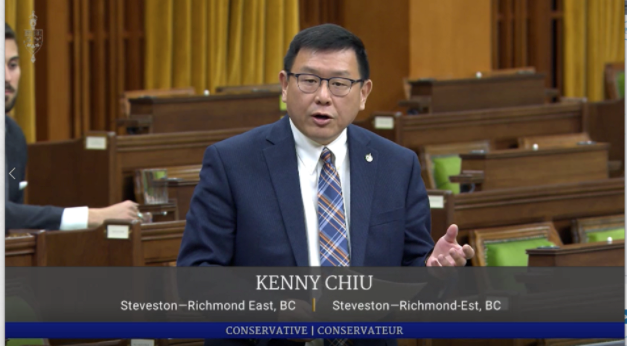Former MP Kenny Chiu is cautioning local politicians to “keep their eyes wide open and be very realistic” about possible influence from the Chinese government.
While Chiu doesn’t think there’s anything wrong with politicians going to Chinese cultural events, he thinks local politicians need to be aware that China is playing the “long game” in trying to influence Canadian politics and politicians.
Chinese culture has a tradition of “guanxi,” a system of building social relationships, which Chiu said can possibly used later as leverage.
Typical rhetoric used to influence politics would be questioning a politician’s support for Taiwan, Chiu explained.
Media reports recently noted how former Vancouver Mayor Kennedy Stewart, after voicing his support for Taiwan, was rebuked on the Vancouver Chinese consul general’s website saying he should “be cautious in his words and deeds on Taiwan-related issue.”
And leading up to the October election, Stewart said his invitations to Chinese-Canadian events waned during the campaign, according to an article from the Globe and Mail last week.
Chiu himself was targeted during the 2019 federal election, when he was running for re-election in Steveston-Richmond East, with misinformation after he proposed a private-members bill to set up a registry of foreign agents.
Chiu lost the campaign to the Liberal candidate Parm Bains.
While campaigning during the last election, Chiu heard this misinformation at the doorsteps of Richmond residents.
Chiu claims the rhetoric about him being anti-Chinese hasn’t abated even though the election is long over.
This includes recent Chinese-language media events where the “mischaracterization” of his position has continued.
“They continue to say Kenny Chiu is a sellout – a traitor to the Chinese people,” Chiu told the Richmond News.
This kind of misinformation pits one group against another, sowing seeds of division, Chiu said.
“They see there’s a wedge they can drive into the ethnic community,” he added.
Chiu noted a lot of misinformation being spread is very “clever,” with an article with false information often embedded in a series of credible articles.
But China, being an autocratic country, is playing the long game, Chiu explained, and they know political parties come and go from power.
Targeting politicians at the local level might have the goal of getting close to people who might move up in politics, for example, running for provincial or federal office.
The Globe and Mail's recently published article outlined that CSIS claims the Chinese consul-general interfered in the fall election.
In an emailed statement to Glacier Media, CSIS spokesperson Eric Balsam said CSIS has identified foreign interference in Canada and targeting of Canadians by the People's Republic of China and the CCP "as the most significant strategic threat to the security of Canada."
"To be clear, the threat does not come from the Chinese people, but rather the CCP that is pursuing a strategy for geopolitical advantage on all fronts — economic, technological, political, and military — and using all elements of state power to carry out activities that are a direct threat to our national security and sovereignty," Balsam said.
Last week, the Consul General of the People’s Republic of China came out with a statement condemning media reports on Chinese interference in Canadian elections.
They claim that Canadians are interfering with China’s internal affairs by bringing up “Taiwan and Hong Kong questions,” not the other way round that China is interfering in Canadian internal affairs.
Foreign agent registry back on the table
When the 2019 election was called, Chiu’s bill to have a foreign agency registry died on the order papers.
It has since been revived by the Senate.
Chiu noted the federal government announced a consultation on the registry in December, and then re-announced it three months later.
Chiu wants the federal government to take action on investigating Chinese interference instead of just talking about it.
“The day I feel vindicated is the day I see Canada take action,” Chiu said.
The revived foreign agents registry is “100 per cent verbatim to what I proposed,” he added.
When he first proposed the registry, the wording was carefully crafted not to point fingers at any country, Chiu said.
While critics say it’s “toothless” because it won’t stop lobbyists, Chiu feels just having a transparent registry will let people know who is trying to influence the government.
“Make it under the sunlight so the (media) can look into it,” Chiu said.
- With files from Mike Howell/Glacier Media and Bob Mackin/BIV



.png;w=120;h=80;mode=crop)